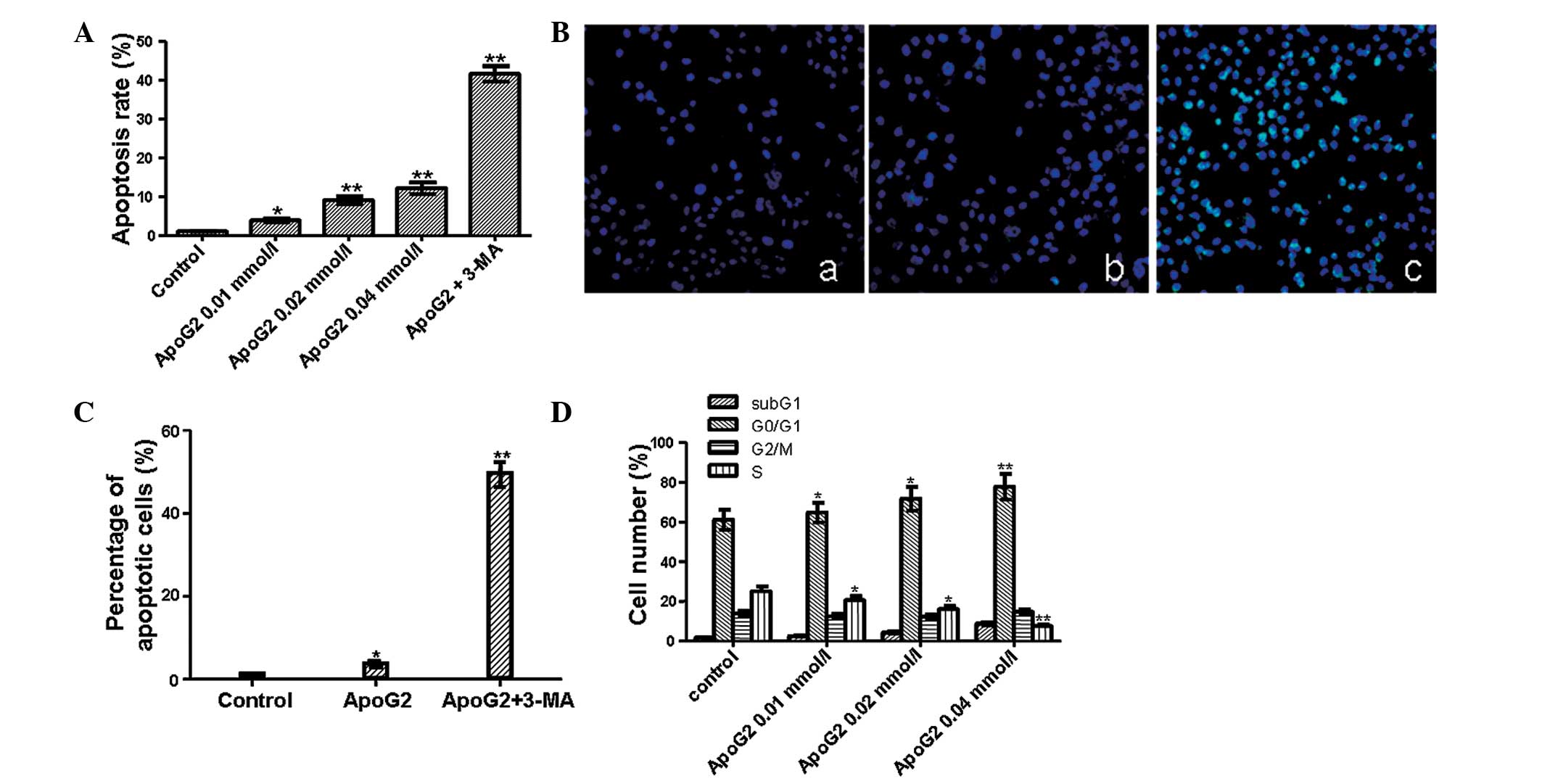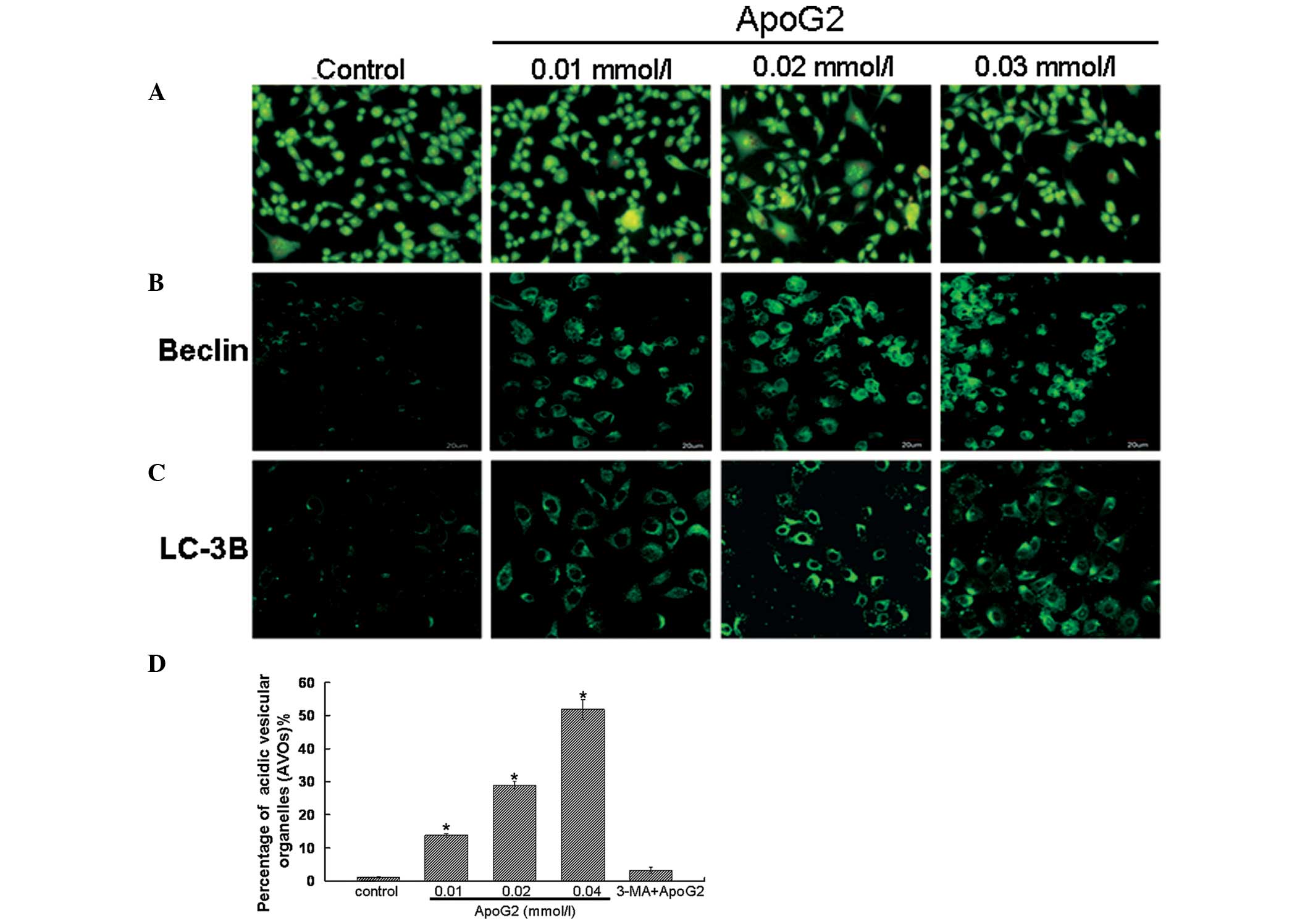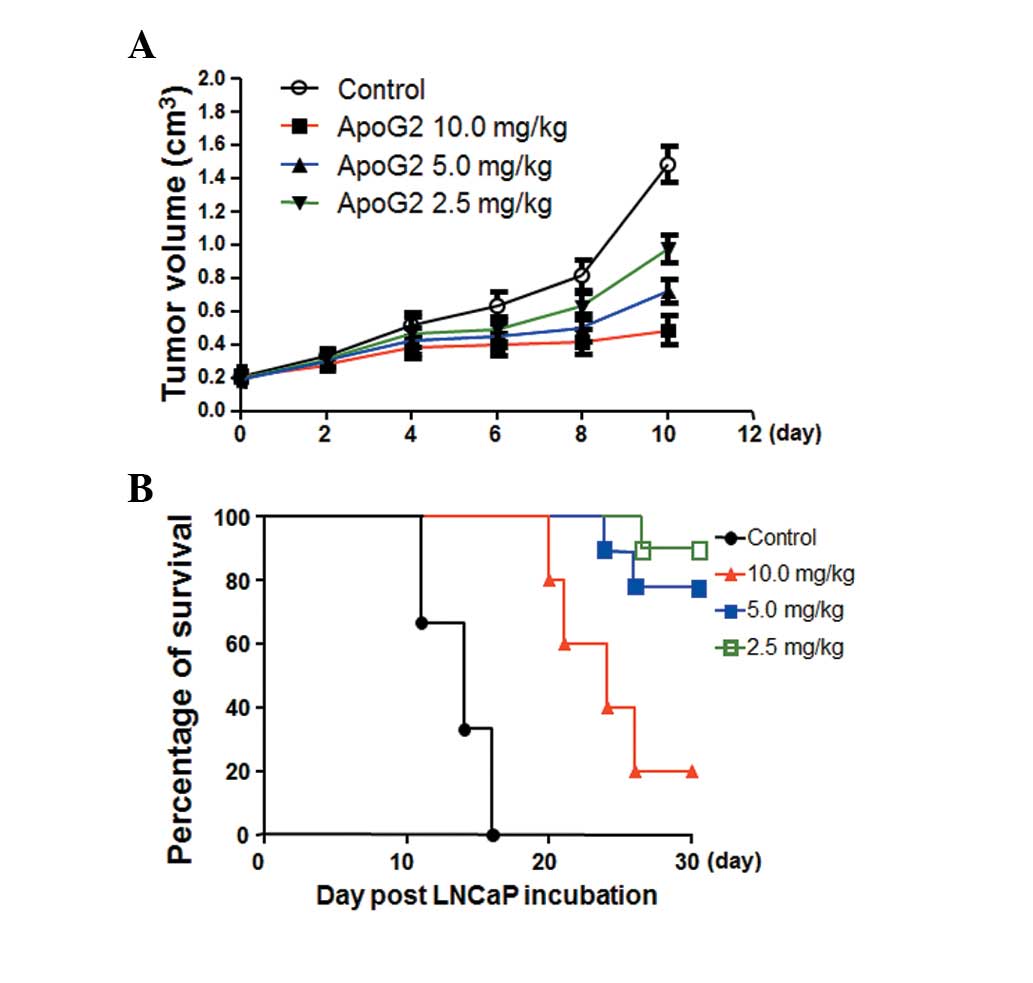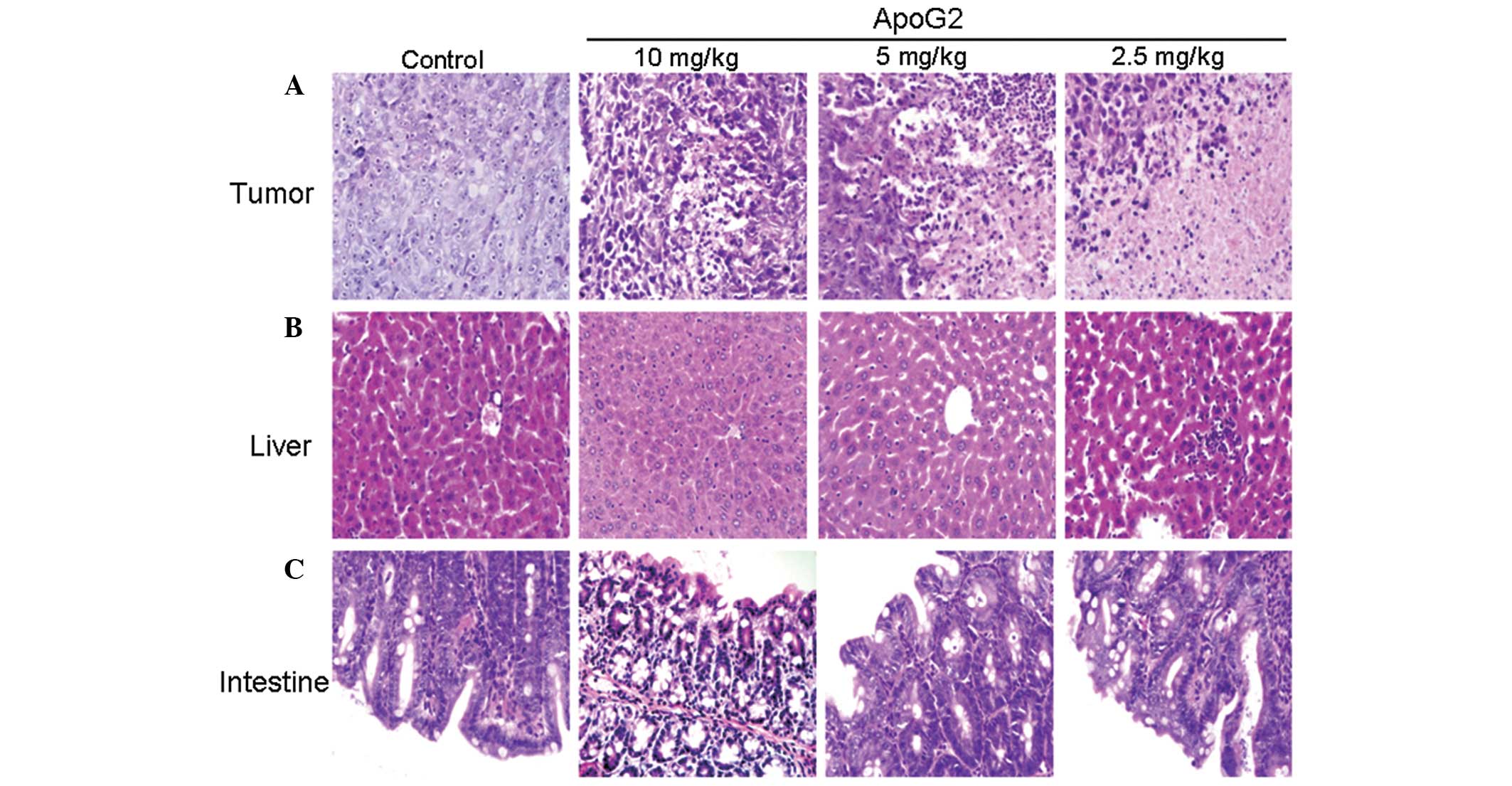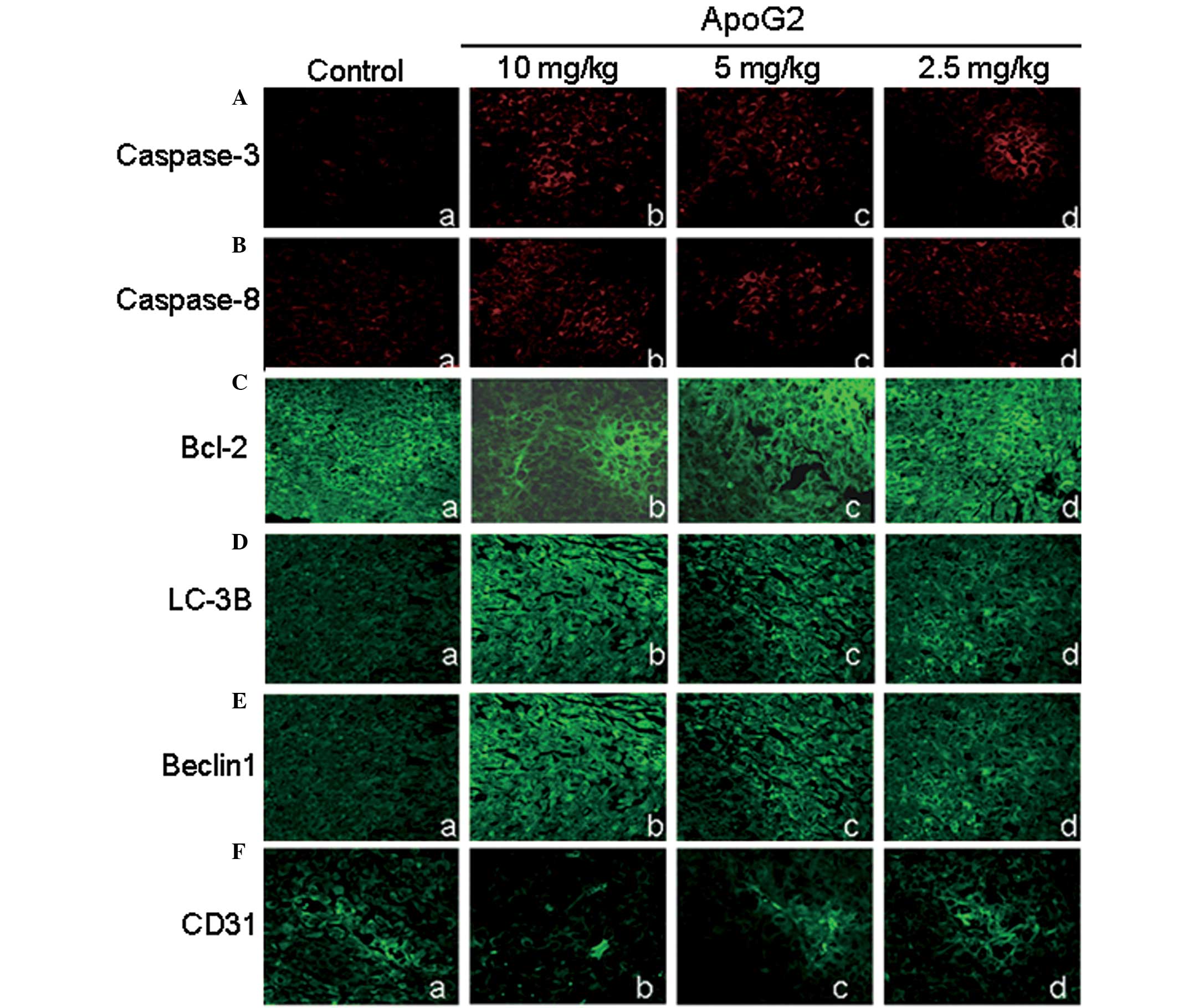|
1
|
Jemal A and Murray T: Cancer statistics,
2005. CA Cancer J Clin. 55:10–30. 2005. View Article : Google Scholar
|
|
2
|
Diaz M and Patterson SG: Management of
androgen-independent prostate cancer. Cancer Control. 11:364–373.
2004.PubMed/NCBI
|
|
3
|
Gioeli D: Signal transduction in prostate
cancer progression. Clin Sci (Lond). 108:293–308. 2005. View Article : Google Scholar : PubMed/NCBI
|
|
4
|
Arnold AA and Aboukameel A: Preclinical
studies of Apogossypolone: a new nonpeptidic pan small-molecule
inhibitor of Bcl-2, Bcl-XL and Mcl-1 proteins in Follicular Small
Cleaved Cell Lymphoma model. Mol Cancer. 7:202008. View Article : Google Scholar : PubMed/NCBI
|
|
5
|
Sun J and Li ZM: ApoG2 inhibits
antiapoptotic Bcl-2 family proteins and induces
mitochondria-dependent apoptosis in human lymphoma U937 cells.
Anticancer Drugs. 19:967–974. 2008. View Article : Google Scholar : PubMed/NCBI
|
|
6
|
Hu ZY and Zhu XF: ApoG2, a novel inhibitor
of antiapoptotic Bcl-2 family proteins, induces apoptosis and
suppresses tumor growth in nasopharyngeal carcinoma xenografts. Int
J Cancer. 123:2418–2429. 2008. View Article : Google Scholar : PubMed/NCBI
|
|
7
|
Mi JX and Wang GF: Synergistic antitumoral
activity and induction of apoptosis by novel pan Bcl-2 proteins
inhibitor apogossypolone with adriamycin in human hepatocellular
carcinoma. Acta Pharmacol Sin. 29:1467–1477. 2008. View Article : Google Scholar : PubMed/NCBI
|
|
8
|
Burton JL, Oakley N and Anderson JB:
Recent advances in the histopathology and molecular biology of
prostate cancer. BJU Int. 85:87–94. 2000. View Article : Google Scholar : PubMed/NCBI
|
|
9
|
Romijn JC, Verkoelen CF and Schroeder FH:
Application of the MTT assay to human prostate cancer cell lines in
vitro: establishment of test conditions and assessment of
hormone-stimulated growth and drug-induced cytostatic and cytotoxic
effects. Prostate. 12:99–110. 1988. View Article : Google Scholar
|
|
10
|
Zhang XQ, Huang XF and Mu SJ: Inhibition
of proliferation of prostate cancer cell line, PC-3, in vitro and
in vivo using (−)-gossypol. Asian J Androl. 12:390–399. 2010.
|
|
11
|
Paglin S and Hollister T: A novel response
of cancer cells to radiation involves autophagy and formation of
acidic vesicles. Cancer Res. 61:439–444. 2001.
|
|
12
|
Alessandri G and Filippeschi S: Influence
of gangliosides on primary and metastatic neoplastic growth in
human and murine cells. Cancer Res. 47:4243–4247. 1987.PubMed/NCBI
|
|
13
|
Deng R, Tang J, Xie BF, et al: SYUNZ-16, a
newly synthesized alkannin derivative, induces tumor cells
apoptosis and suppresses tumor growth through inhibition of PKB/AKT
kinase activity and blockade of AKT/FOXO signal pathway. Int J
Cancer. 127:220–229. 2010. View Article : Google Scholar
|
|
14
|
Klionsky DJ, Abeliovich H, Agostinis P, et
al: Guidelines for the use and interpretation of assays for
monitoring autophagy in higher eukaryotes. Autophagy. 4:151–175.
2008. View Article : Google Scholar
|
|
15
|
Mains RE and May V: The role of a low pH
intracellular compartment in the processing, storage, and secretion
of ACTH and endorphin. J Biol Chem. 263:7887–7894. 1988.PubMed/NCBI
|
|
16
|
Traganos F and Darzynkiewicz Z: Lysosomal
proton pump activity: supravital cell staining with acridine orange
differentiates leukocyte subpopulations. Methods Cell Biol.
41:185–194. 1994. View Article : Google Scholar
|
|
17
|
Wu D: An overview of the clinical
pharmacology and therapeutic potential of gossypol as a male
contraceptive agent and in gynaecological disease. Drugs.
38:333–341. 1989. View Article : Google Scholar : PubMed/NCBI
|
|
18
|
Tuszynski GP and Cossu G: Differential
cytotoxic effect of gossypol on human melanoma, colon carcinoma,
and other tissue culture cell lines. Cancer Res. 44:768–771.
1984.
|
|
19
|
Wang X, Wang J and Wong SC: Cytotoxic
effect of gossypol on colon carcinoma cells. Life Sci.
67:2663–2671. 2000. View Article : Google Scholar : PubMed/NCBI
|
|
20
|
Oliver CL, Bauer JA, Wolter KG, et al: In
vitro effects of the BH3 mimetic, (−)-gossypol, on head and neck
squamous cell carcinoma cells. Clin Cancer Res. 10:7757–7763.
2004.
|
|
21
|
Mohammad RM, Wang S, Aboukameel A, et al:
Preclinical studies of a nonpeptidic small-molecule inhibitor of
Bcl-2 and Bcl-X(L) [(−)-gossypol] against diffuse large cell
lymphoma. Mol Cancer Ther. 4:13–21. 2005.
|
|
22
|
Xu L, Yang D, Wang S, et al: (−)-Gossypol
enhances response to radiation therapy and results in tumor
regression of human prostate cancer. Mol Cancer Ther. 4:197–205.
2005.
|
|
23
|
Arnold AA, Aboukameel A, Chen J, et al:
Preclinical studies of apogossypolone: a new nonpeptidic pan
small-molecule inhibitor of Bcl-2, Bcl-XL and Mcl-1 proteins in
follicular small cleaved cell lymphoma model. Mol Cancer. 7:20–29.
2008. View Article : Google Scholar : PubMed/NCBI
|
|
24
|
Kisen GO, Tessitore L, Costelli P, et al:
Reduced autophagic activity in primary rat hepatocellular carcinoma
and ascites hepatoma cells. Carcinogenesis. 14:2501–2505. 1993.
View Article : Google Scholar : PubMed/NCBI
|
|
25
|
Pattingre S, Tassa A, Qu X, et al: Bcl-2
antiapoptotic proteins inhibit Beclin 1-dependent autophagy. Cell.
122:927–939. 2005. View Article : Google Scholar : PubMed/NCBI
|
|
26
|
Wang L and Yu C: TMEM166, a novel
transmembrane protein, regulates cell autophagy and apoptosis.
Apoptosis. 12:1489–1502. 2007. View Article : Google Scholar : PubMed/NCBI
|
|
27
|
Xue L, Fletcher GC and Tolkovsky AM:
Autophagy is activated by apoptotic signalling in sympathetic
neurons: an alternative mechanism of death execution. Mol Cell
Neurosci. 14:180–198. 1999. View Article : Google Scholar : PubMed/NCBI
|
|
28
|
Bauvy C and Gane P: Autophagy delays
sulindac sulfide-induced apoptosis in the human intestinal colon
cancer cell line HT-29. Exp Cell Res. 268:139–149. 2001. View Article : Google Scholar : PubMed/NCBI
|
|
29
|
Cui Q and Tashiro S: Autophagy preceded
apoptosis in oridonin-treated human breast cancer MCF-7 cells. Biol
Pharm Bull. 30:859–864. 2007. View Article : Google Scholar : PubMed/NCBI
|

















